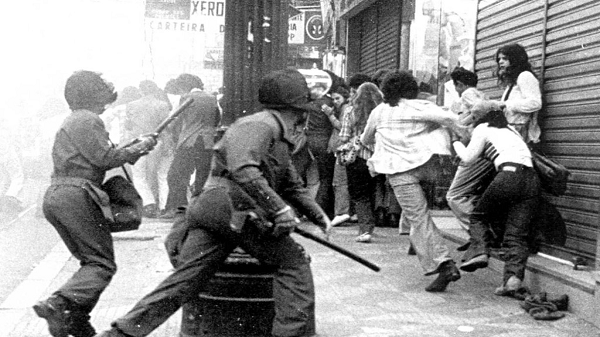Military dictatorships are forms of government in which political power is controlled by generals and army commanders.
Although they are highly criticized for their authoritarianism and for affront to democracy, military regimes are still in force in several countries around the world, such as North Korea, Thailand, Egypt, etc.
Furthermore, even in the 20th century, countries like Portugal, Chile, Argentina, Spain and Germany also went through periods of military dictatorship, illustrating the ease with which this type of regime achieves power.
In the case of Brazil, the military regime began in 1964 with the coup that overthrew the government of João Goulart and lasted until 1985, when José Sarney assumed the presidency. During this period the country had six military presidents chosen through indirect elections (without the participation of the people), three of which were carried out by the National Congress and three by the Electoral College.
Check out the main characteristics of this model of government below.
1. Censorship

Military regimes tend to censor the freedom of expression of citizens, artists and the press as a way to protect the integrity of the system. Thus, any manifestations contrary to the government's ideals are seen as forms of rebellion and are promptly tackled, especially those with high potential for reach, such as works by artists and broadcasts in the press.
In the early 70s, through Decree-Law No. 1,077, the prior censorship which consisted of a Federal Police department formed by a team of censors who evaluated the content of magazines and newspapers to decide if they could be published.
2. authoritarianism and violence

The military uses violent methods to ensure control and discourage anti-government demonstrations. In military regimes, the use of firearms is common and cases of torture and disappearances are common.
In Brazil, the National Truth Commission - CNV instituted in 2011 by then-president Dilma Rousseff had the objective of investigating human rights violations that occurred during the dictatorship. At the end of the work, the commission estimated a total of 434 politically motivated deaths and disappearances.
3. centralization of power

Kim Jong-un, leader of North Korea demonstrating his country's military might.
Military regimes tend to suppress the separation of powers and centralize political power in the hands of the ruling group. Thus, it is common for the same group to control the executive, legislative and judiciary. As in Brazil, in 1968 the Institutional Act Number Five (AI-5), the most rigorous presidential decree of the Brazilian dictatorship. Among its main effects were:
- the possibility for the executive branch to suspend the activities of the legislative branch across the country;
- the presumption of legitimacy of the acts issued by the president, regardless of any type of judicial review;
- legislation through decree-laws issued by the executive;
- arbitrary federal intervention at the state and municipal level.
4. Dismissal of political rights

Registration of the "Diretas Já" movement that claimed the right to direct presidential elections in Brazil.
As a natural consequence of censorship and centralization of power, military regimes prohibit the formation of opposing political parties, greatly hindering the transition of power and the propagation of new ideologies.
In Brazil, the Institutional Act Number One (AI-1), issued in 1964, allowed the government to:
- suspend the political rights, for ten years, of any citizen who demonstrates ideals contrary to the regime;
- revoke legislative mandates in any federative sphere;
- remove civil servants from their positions.
5. Illegitimacy

Humberto de Alencar Castelo Branco, first president of the military dictatorship in Brazil.
Military regimes are usually instituted after coups d'etat, through which the Armed Forces (usually the army) take control of political power in moments of institutional weakness. Thus, there is no form of social participation in the choice of government representatives, making it totally illegitimate.
See too:
- Military coup
- Military dictatorship
